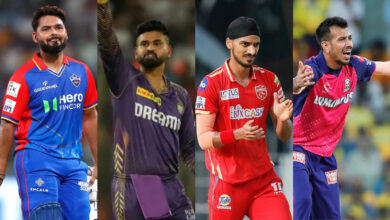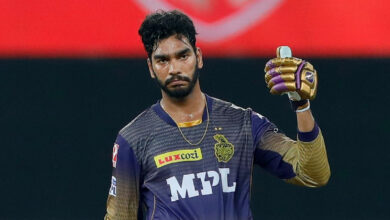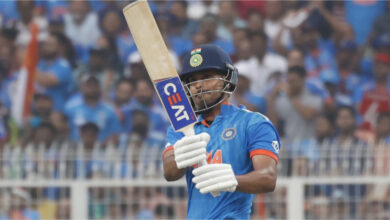From rejection to redemption: Gundogan’s journey from being a migrant to City’s title decider

Six years ago, during a tense duel between Bayern Munich and Borussia Dortmund, Ilkay Gundogan was waiting in the tunnel for the second half to start. Just then Pep Guardiola, then Bayern’s manager, nudged him with his arm, as he went past him. Gundogan stood awestruck, like a fanboy meeting his hero. “I was just like, what the hell was that? It was a casual thing, but why? Surely you would only do that if you liked someone a little bit, right?” He recollects that moment in a piece for The Player’s Tribune.
All his adult life, Gundogan grew up idolising Guardiola — whose Barcelona batch Gundogan considers the best in club football hory. But playing for Barcelona or under the Catalan manager was a dream he had never dreamt. For, he was afflicted with self-doubt. For he was often seized a fear of rejection. Every time he begins to dream, memories of an unpleasant evening roll back into his mind.
He was just eight and had just been acquired FC Schalke, his hometown club. But after an injury-ridden season, he was asked to go. “They literally threw me out. The incident left me scarred forever. Just imagine a child being woken up in the middle of a dream. After that incident, I became scared to dream, I would always keep a window open for disappointment,” he told bundesliga.com.
He returned to his childhood club SV Gelsenkirchen-Hessler 06, who play in the lower divisions of German amateur football in his hometown Gelsenkirchen, the largest and most populous urban area in Germany, known for coal mining. It’s coal that brought his family from a suburb in anbul to Gelsenkirchen in the early 1990s. First arrived his grandfather before the entire family relocated to Germany. His mother became a cook in a swimming-hall restaurant, while his father, Irfan, was a truck driver for a beer company.
The family loved its football — Gundogan’s first footballing memory is watching a UEFA Super Cup game between Arsenal and Galatasaray in 2000 on TV and his uncle Ilhan crying when the Turkish giants won the match on penalties. But the dreams of an aspirational migrant family centred so much on education that he had to focus on academics as well. “They just wanted me to do well at school. Like really wanted me to do well. I still have nightmares about school. I’m not joking. I can wake up in a cold sweat from thinking about old exam papers,” he wrote in The Players’ Tribune.
Start of the journey
Three years later, Schalke wanted him back. He refused. The pain was still too raw. But upon his uncle’s insence, he joined Bochum FC, in the neighbourhood but a semi-professional team. Then at 17, an age when the best of footballers make their first-team debuts, Gundogan realised that he had the quality to play elite-level football. The scars of the Schalke snub had begun to heal. “I was like, huh, I could do something here.”
Six months later, Gundogan made his first foray into Bundesliga football, when FC Nürnberg acquired him. But harsher realities were to strike. He felt terribly lonely — he missed the quaintness of his hometown in a bustling city, the senior players bullied and ragged him, he got injured, and struggled to find an apartment as migrant-phobia festered in Germany. Even Turkish migrants used to refuse, until he became a first-team regular and they started seeing him more on TV. He suddenly remembered Schalke. It gave him strength. “I actually remember being grateful that Schalke had rejected me. I had already faced this huge disappointment, so I was kind of prepared for another struggle. In the end, that’s what helped me break through at Nürnberg and have two successful seasons there. The longer you go in life before suffering a setback, I think the harder it is to handle,” he told bundesliga.com.
Then came Jurgen Klopp’s Liverpool and the heady Dortmund days, when he became a target for most top clubs in Europe. Guardiola was among his admirers, and a few months after the tunnel nudge, he was sitting face to face with his idol, who had joined Manchester City and wanted Gundogan to be his first acquisition. He just had one question in mind to ask him. “Do you really want me? Like, really, really?”
Guardiola laughed and said a “yes.” Gundogan met his benediction. The vindication of his choices. At Etihad, he was immediately slotted in as a defensive midfielder, chiefly because the regular No 6, Fernandinho, was injured. Adept at functioning in a variety of roles — he began as a classical No. 10 before Klopp repositioned him to the base of the midfield, interchanging between a defensive screen and a deep-lying playmaker — he frictionlessly slipped into the role. But when City brought Rodri in 2019 and veered away from the double-defensive midfield gameplan, his appearances began to dwindle. A spate of ill-timed injuries did not help.
Pep’s favourite
But Guardiola transforms players; few languish under him. David Silva’s departure had left a midfield vacuum. Gundogan is not a creator or a trickster like Silva, but has an impeccable passing range, a playmaker’s intuition and a striker’s nose for goal. Midway through last season, he was repurposed as a box-to-box midfielder with the licence to thrust forward and drift into the space created the conventional forwards. Goals began to fly off his boots — goals with a poacher’s instinct and midfielder’s finesse. Gundogan netted 22 in the first four seasons; in the next two, he blasted 25. He was City’s highest goal-scorer the previous season (17) while the returns dwindled this edition because he had to juggle with defensive-midfield duties. There were goals of all sorts — headers, toe-pokes, tap-ins, grass-trimmers, snap-shots and pile-drivers.
Midway through last season, Gundogan was repurposed as a box-to-box midfielder with the licence to thrust forward and drift into the space created the conventional forwards. (Twitter)
Two of those goals arrived in a manic five-and-a-half minutes that changed City’s night from prospective mourning to utter jubilation. Both were from the striker’s book — the first a header at the far post and the winner a tap-in after an unmarked gallop from midfield. Guardiola perhaps knew this before, as last year, he extolled the virtues of Gundogan: “He is a guy who has an incredible sense of goal. It is not just knowing the right time to arrive at the box, it is the right second. This is the most difficult thing. Not to arrive one metre before, or one metre later, but at exactly the right time, and Gundo has this sense.”
Not just his anticipation but Guardiola praised his finishing skills too. “And it’s not just that – with his finishing too he has this way to control the ball, slow down and take a second to compose himself and see what happens, and be clinical.” As if Guardiola had watched those two goals a year ago.
At the post-match interview, Gundogan had just the energy to put together, “These are the days you look back to.” Just like that night in Dortmund, where he got a nudge of appreciation from Guardiola, or the evening in Schalke, where it all ended and began for the grandson of a Turkish migrant from the mining town of Gelsenkirchen.







